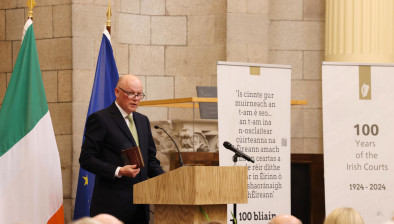Disappointment that Supreme Court isn’t streaming hearings on judicial appointments bill

Legal academics have expressed disappointment that Supreme Court hearings on the constitutionality of landmark judicial appointment reforms are not being live-streamed.
The Supreme Court today began hearing arguments on the constitutionality of the Judicial Appointments Commission Bill 2022, which was referred to the court by President Michael D. Higgins last month under Article 26 of the Constitution.
It is the first time that President Higgins has referred a bill to the court through the Article 26 procedure.
In a series of tweets earlier this week, Professor Donncha O’Connell of the University of Galway said the failure to arrange for live-streaming of the hearings was a “missed opportunity… to enable the public to observe a rare but important process”.
He added that typical arguments against the broadcasting or live-streaming of court proceedings “do not apply to hearings under Article 26 where there are no parties, in the normal sense, but where the public has a direct and legitimate interest in the hearings and the outcome”.
The question of broadcasting or live-streaming from the Irish courts has become more prominent in recent years. A pilot project in 2017 saw the handing-down of two Supreme Court judgments broadcast live on RTÉ, though this did not become a permanent practice.
Irish Legal News understands that the positive experience of remote court hearings during the pandemic has led to serious consideration being given to streaming court proceedings to a wider audience, though there is no clear idea of when and how this could start.
North of the border, the Lady Chief Justice of Northern Ireland recently expressed her support for a pilot of broadcasting the handing-down of judgments from the superior courts.
The Supreme Court will conclude its hearings on the judicial appointments bill tomorrow.










